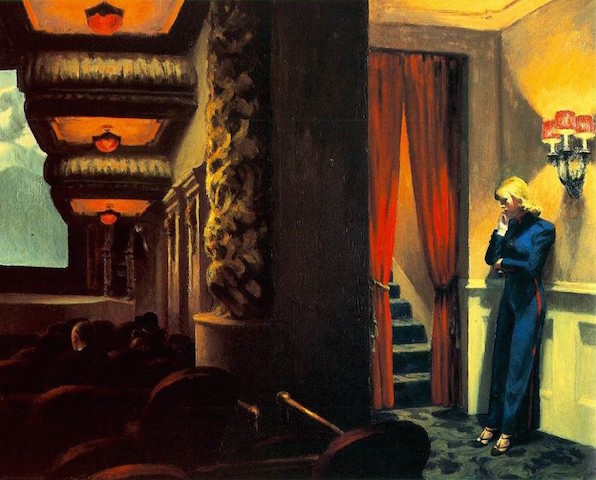Edward Hopper has always been one of my favorite artists. His attention to detail, straight lines, and use of color draw in my eye. But I think what really connects me to his paintings is his exploration of loneliness and isolation. Instead of making us feel sorry for the lonely subjects, we want to know their story. We feel an affinity to them. Their loneliness becomes ours. It doesn’t feel sad or depressing. It’s more of a thoughtful and pensive kind of isolation. That can sometimes be a good thing.

I imagine that Edward Hopper had more than his share of loneliness. But his loneliness was the productive kind. It’s how he fulfilled his unique creative process. The painting you see above is one of Hopper’s most well known. It’s called New York Movie. Before he painted it, Hopper drew 54 studies of movie theaters and his wife as the model. He would spend days and days visiting different theaters and doing drawings. Then he would come home and sketch his wife.
In fact, Hopper drew more than he painted. He painstakingly sketched people and places before he painted. He said that painting was a difficult process for him and he only painted two or three paintings a year. It took him six weeks to three months simply to produce one.
Funny thing is that modern day curators now see the drawings themselves as significant art. Hopper refused to produce a book of his drawings because he didn’t think they were good enough. Apparently others vehemently disagree.
Here are the lessons for anyone creating anything:
- We don’t always get to decide whether our art is good or not. Others sometimes see things that we can’t. To paraphrase a famous saying: Art is in the eye of the beholder.
- Background work is valuable to the finished product. Hopper’s paintings would never have been as good without the all the preparatory sketches. A first draft of your work will never be as good as a fifth, tenth, or twentieth iteration.
- Even difficult (for us) art is worth producing. Hopper had to work hard at his painting. But it made him money and it made him famous. Art doesn’t necessarily come easily. But sometimes effort is very much worth the result.
- Time alone makes for great productivity. With a goal in mind, isolation is time for hunkering down and doing the work that needs to get done. It’s what Hopper did with his sketching. And he produced some incredible work focusing on isolation itself.
So do the (sometimes) lonely work that leads to great art. We will thank you for it.
What lessons do you learn from Hopper?
This is part of an occasional series of lessons in creativity from creative masters.









